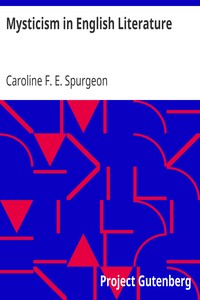Mysticism in English Literature by Caroline F. E. Spurgeon
"Mysticism in English Literature" by Caroline F. E. Spurgeon is a scholarly exploration of the concept of mysticism as it relates to notable English writers, written in the early 20th century. This work seeks to define mysticism, tracing its philosophical roots and examining how it manifests in the works of various poets and prose writers. The book emphasizes the idea that mysticism is not merely a set of beliefs but an experiential
attitude that connects the individual with a greater universal truth. The opening of the book lays the groundwork for this exploration by clarifying the term "mysticism" and its often mistaken interpretations. Spurgeon discusses how the concept has evolved from ancient philosophical thought, specifically referencing figures like Plato and Plotinus, to its presence in English literature. She articulates that mysticism represents a conviction of unity underlying all existence, distinguishing between the intellectual understanding and the direct experiential knowledge of this unity. The author begins to outline how leading English writers, including Wordsworth, Blake, and Browning, express mystical thoughts through their works, inviting readers to delve deeper into the interplay between literature and spiritual experience. (This is an automatically generated summary.)
Read or download for free
| How to read | Url | Size | |||
|---|---|---|---|---|---|
| Read now! | https://www.gutenberg.org/ebooks/11935.html.images | 268 kB | |||
| EPUB3 (E-readers incl. Send-to-Kindle) | https://www.gutenberg.org/ebooks/11935.epub3.images | 191 kB | |||
| EPUB (older E-readers) | https://www.gutenberg.org/ebooks/11935.epub.images | 190 kB | |||
| EPUB (no images, older E-readers) | https://www.gutenberg.org/ebooks/11935.epub.noimages | 169 kB | |||
| Kindle | https://www.gutenberg.org/ebooks/11935.kf8.images | 382 kB | |||
| older Kindles | https://www.gutenberg.org/ebooks/11935.kindle.images | 353 kB | |||
| Plain Text UTF-8 | https://www.gutenberg.org/ebooks/11935.txt.utf-8 | 247 kB | |||
| Download HTML (zip) | https://www.gutenberg.org/cache/epub/11935/pg11935-h.zip | 181 kB | |||
| There may be more files related to this item. | |||||
Similar Books
About this eBook
| Author | Spurgeon, Caroline F. E. (Caroline Frances Eleanor), 1869-1942 |
|---|---|
| Title | Mysticism in English Literature |
| Note | Reading ease score: 62.6 (8th & 9th grade). Neither easy nor difficult to read. |
| Credits | Produced by Distributed Proofreaders |
| Language | English |
| LoC Class | PR: Language and Literatures: English literature |
| Subject | English literature -- History and criticism |
| Subject | Mysticism -- Great Britain |
| Subject | Mysticism in literature |
| Category | Text |
| EBook-No. | 11935 |
| Release Date | Apr 1, 2004 |
| Most Recently Updated | Dec 26, 2020 |
| Copyright Status | Public domain in the USA. |
| Downloads | 316 downloads in the last 30 days. |
| Project Gutenberg eBooks are always free! | |

